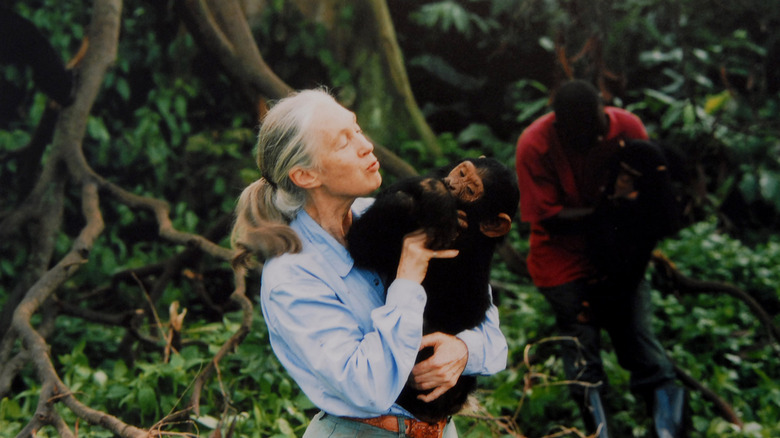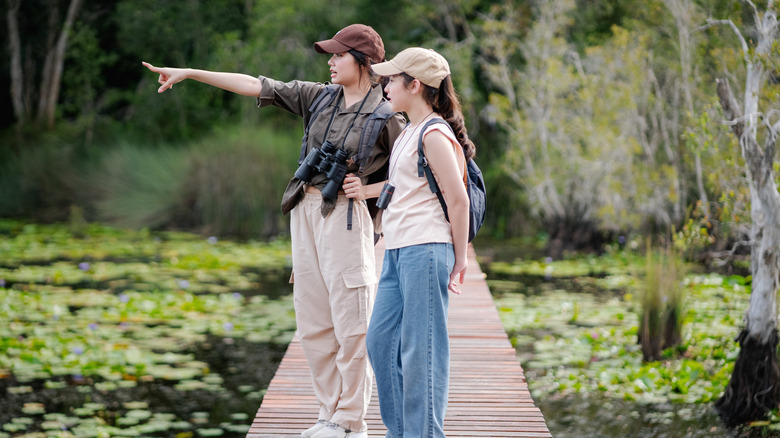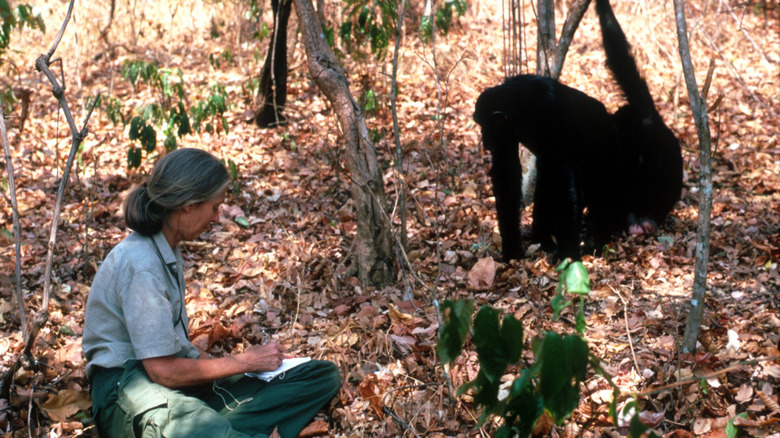Dr. Jane Goodall's Sustainable & Responsible Approach To Wildlife Tourism Is A Win-Win
The legendary primatologist and conservationist, Doctor Jane Goodall, passed away on Wednesday, October 1, 2025 at 91 years old. Despite her advanced years, she was still traveling regularly for various speaking engagements. At the time of her death, she was in California and was set to give a talk at UCLA on October 3. Although Dr. Goodall is no longer with us, she leaves behind an incredible legacy and valuable lessons for travelers around the world. She was a staunch defender of wildlife and believed that tourists could make a difference by traveling better.
Dr. Goodall thought each and every one of us has the capacity to change the world. "You cannot get through a single day without having an impact on the world around you. What you do makes a difference, and you have to decide what kind of difference you want to make," she once said. In order to make our impact more positive, she suggested living a more sustainable life and being a responsible traveler — especially when it comes to animal tourism.
In the wise words of Dr. Goodall: "We have the choice to use the gift of our life to make the world a better place — or not to bother." She claimed that wildlife tourism — when done the right way — can benefit both people and the natural world. Next time you're planning a trip follow in her footsteps by choosing to participate in conservation tourism.
Tourism can have a positive impact on wildlife when it's done right
Traveling is all about gaining new experiences. When we travel we may hope to immerse ourselves in a culture that is different from our own, learn about history, or surround ourselves in nature's beauty. Most tourists don't set out on a trip hoping to be destructive, but the tourism industry certainly can have negative impacts on nature and wildlife. Over-tourism has become a major problem in certain parts of the world and wildlife tourism can be detrimental to animals if it isn't done ethically. Dr. Goodall retained hope that tourism could be a force of good and that traveling could be a win-win for people and animals.
There are plenty of epic destinations for people who are obsessed with animals, but not all of them are safe and respectful for the animals themselves. According to Dr. Goodall, the key is to properly manage tourism. She told Travel + Leisure that, "sometimes tourism exploits the animals terribly," but added that as long as it's managed the right way it can be very important for animal conservation efforts. She noted that wildlife tours can have a "major effect" on people. They also help fund nature preserves and create jobs for the local communities — all of which inspire locals and visitors to respect and protect animals.
"Many wildlife species such as chimps and gorillas would not survive without tourism. I know how people have been utterly changed by looking into the eyes of a wild chimpanzee. They are never the same again. The message is not to stop tourism, but to make sure we get it right. In essence, tourism is good, provided the benefits accrue to the local people so they become partners in saving nature," she told National Geographic in an interview.
Choose to support ethical wildlife tourism
The Jane Goodall Institute, a non-profit dedicated to protecting animals and the environment, poses an important question on their website. "How do we ensure that in our wish to get closer to nature and appreciate wildlife, we do good, rather than harm?" According to JGI, it's best to support conservation tourism – programs that go "well beyond mitigating against potential risks, seeking actively to create conservation gains."
As a tourist, your goal should be to take sustainable tourism a step further. The best tour operators should be concerned with protection and conservation first and foremost. Make sure that the experiences you choose are working to minimize impacts on the environment and local communities. Do thorough research before booking a wildlife experience to ensure that it does not harm animals or their ecosystems. If you notice any unethical behaviors or shady tour operators during your travels, report them to the proper authorities right away. If you're working with a travel agent, let them know that you're committed to ethical wildlife tourism during the trip planning process.
"Every individual matters. Every individual has a role to play. Every individual makes a difference," said Dr. Jane Goodall. Next time you're planning a trip, remember her wise words and choose to participate in conservation tourism. Take steps to minimize your carbon footprint while traveling, respect animals, and opt to support organizations with a positive impact on the earth.


